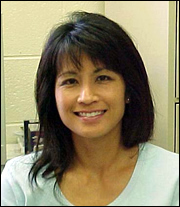
As an undergraduate, Michelle Whaley took a summer job inWashingtonstate working with children with disabilities.
Its amazing how an experience like that can get under your skin.
Whaley completed her doctorate in biology at Notre Dame in 1993 and immediately began teaching genetics and cell biology and doing research in molecular genetics. She missed working with people with disabilities and called the local Special Olympics office with an offer to help. That launched a many-year stint as a coach, particularly in power lifting.
In 1997, Whaley attended a speech by Mary Jane Owen, founder of Disabled Catholics in Action during Disabilities Awareness Week on campus. In her speech, Owen, who suffered multiple disabilities, suggested that the interests of geneticists ran contrary to those of disabled persons. Simply put, geneticists see disabilities as something that should be fixed or eliminated.
As a geneticist, Whaley says she was shocked: She had never really looked at it that way before.But as someone who worked with disabled people, Whaley understood the speakers concern: To know the disabled is to understand that they are not necessarily broken.They have a unique happiness an outlook on life that puts things in perspective. A world without disabled persons would be a sadder world,Whaley says.
Thats when I started to link genetics with disabilities in the classroom.Students studying genetics needed to connect what they were learning in the classroom to real people, she explains.
With the cooperation of the Center for Social Concerns, Whaley began introducing a disabilities service learning project into a freshman honors genetics course. Students could choose to do a research project, but the majority accepted her challenge to volunteer regularly atLoganCenterand to write papers about their firsthand experiences observing the link between genetics and disabilities.
Theyre learning that people with disabilities are not that different from themselves,Whaley says.They have jobs, school, happiness, sadness.One students observation is permanently posted in Whaleys office:One does not grow in wisdom, tolerance, or love if one knows only people who are like oneself.
She is a geneticist who really wants her students to put a real face with an issue,says Marissa Runkle, who has coordinated the service part of Whaleys class through the Center for Social Concerns. Twenty percent of Whaleys students continue to volunteer atLoganCenterafter theyve finished the course, Runkle says.
In fall 2005, the course will be expanded and offered to all biology majors, whose ranks include future doctors and researchers. Whaley says she wants to develop awareness thatas geneticists, we should not be blind to the needs of real people.
Among realities these students will face: parents who are aware their child will be born with birth defects and who will welcome that child. Whaley wants to educate future physicians and researchers who can step back from societal pressures for perfection and support these parents, while continuing to appreciate and help those with disabilities.
TopicID: 10687